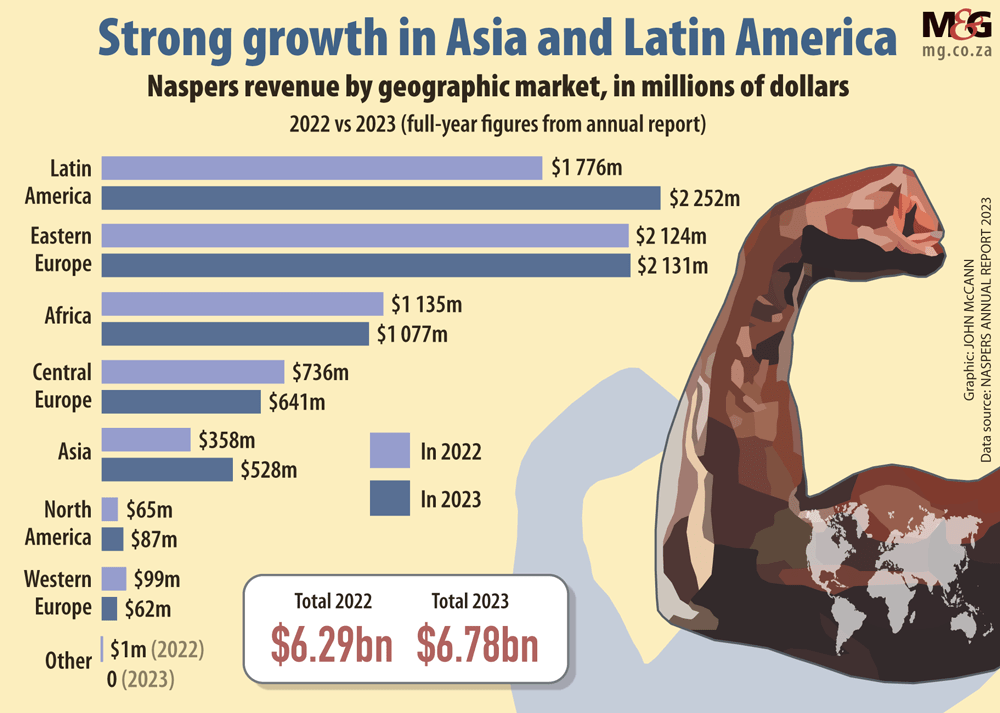

When Naspers first browsed around India looking for investment opportunities, then chief executive Koos Bekker thought company valuations to be unrealistic. As in, too expensive.
It was 2006 and the eye-watering growth in China was starting to transform the world.
Bekker had already found success in the tech startup Tencent and he, like just about everyone with money to back new ventures, was looking for the next big thing.
At the time, the Indian stock market was having a good run, fuelled by expectations that hundreds of millions of consumers would soon wake up from a long slumber and start spending. It was a Rip van Winkle scenario and the South Africans wanted a winkel of their own in India.
But because of those unrealistic valuations, Bekker and his team ended up not investing in an established business, instead setting up their own shop called Ibibo. It was an internet business with an eye on instant-messaging, e-mail and gaming applications.
Before long, Ibibo began morphing and merging and eventually formed part of a bigger group with Naspers as a minority shareholder. The core function of that business was to use the internet to help plan journeys.
Ironically, a planned journey is not what Naspers took on the subcontinent. But in recent years the company has shown a much clearer itinerary, pouring more money into India than anywhere else.
Its two largest punts in this nation of about 1.4 billion people are in online payments business PayU and food delivery phenomenon Swiggy. Together, they represent a decent clump of the group’s exposure excluding China’s Tencent.
About 20% of the value of the company’s e-commerce portfolio is now in India, says Naspers chief financial officer Basil Sgourdos.
“And our intention is to do more,” adds his boss, interim chief executive Ervin Tu.
These two are, of course, also the CFO and CEO of Prosus, the Amsterdam-listed investment vehicle through which Cape Town-based Naspers holds its investments in foreign companies.
The most notable of these stakes is obviously the chunk it owns of Tencent, that Chinese technology giant which has done everything from social media to financial services, from gaming to education, and from electronic retail to food delivery.
Mix it up properly and you have a potent cocktail of digital life in China. And this dop was really what got the party started for Naspers. The group pocketed billions in dividends and realised many billions more in selling down its stake from the nearly 34% it held half a decade ago to 25% today. What it has left is still worth about $100 billion. Not bad for an initial investment of $32 million made 22 years ago.
Obviously, Naspers wants to order another round. It wants something that tastes like Tencent, with a tiny umbrella, a cherry and a straw that does not go soggy after a few sips.
“We love Tencent,” says Tu, a former Softbank executive who has been with Prosus for two years. Since taking the reins a few months ago, he has used every occasion to stress that selling down the stake in the Chinese giant should not be read as a lack of confidence in its prospects.
But the messaging is also clear that some of Naspers’s best prospects lie in India. The company’s half-year results were presented from a hotel in New Delhi this week. The latest board meeting was also held on Indian soil.
“We feel great about the opportunity India represents,” says Tu.
The global portfolio (excluding Tencent) he inherited from Bob van Dijk — the surfing Dutchman who ran Naspers for a decade, listed Prosus in Europe and both created and unwound a complicated cross-holding structure between the two — could manage an internal rate of return of only 5% a year since 2008. “Unsatisfactory,” says Tu.
The board has now empowered him to drive a strategy that makes it clearer that the investments in Brazil’s iFood, online classifieds firm OLX and the Indian businesses are actually worth tens of billions of dollars. Value that has been overshadowed by Tencent for a decade.
And in India, the focus seems strongest. Stock market listings for Swiggy, in which Prosus holds 33%, and PayU, which it owns outright, are in the pipeline.
Referring to PayU, Tu says “we are working very hard to prepare the business to be in a listable form”.
It is likely to be floated some time in the second half of next year. Part of those preparations was to make PayU look like a business that should be on the stock market in Mumbai and so most of the tentacles outside India were sold off earlier this year for $600 million.
With Swiggy, Naspers/Prosus holds less sway. But the tone from the top is that it will look seriously at supporting a listing if it is in the best interest of the company. That’s investment banker speak for “ja, well, no, fine”.
And why not? Is there a better place for a consumer-facing business focused on food and grocery delivery than India?
The country’s economy had been expanding since before the Covid-19 pandemic and though it suffered a hiccup just like the rest of us, growth returned thereafter and has continued at a brisk pace, not like the rest. In 2010, India had the world’s ninth-largest GDP, but by last year it had overtaken European powerhouses the United Kingdom and France to slot in at fifth.
Despite all this expansion, labour costs remain relatively low. Employing someone with similar skills costs you only at tenth of what it would in China, show the PowerPoint slides Prosus executives whip out in presentations.
Just think, if you are in the tech business, cheap engineers come in handy. Even better is an ecosystem where startups are launched regularly. It means that all the skills needed to build a new giant — from management, to investor savviness, to regulatory understanding — are present.

That is also why Naspers has backed some earlier-stage entrepreneurs in the country.
Meesho seems to do something very similar to Swiggy, but it aims at “Tier 2” cities and beyond. Think of it as Checkers Sixty60 servicing customers deep in rural Limpopo or KwaZulu-Natal, but those villages mostly have a population of more than one million each. Prosus holds a 14% stake in Meesho.
And there are others. A few of these portfolio companies in India are at a scale where they may consider listing, depending on market conditions, says Ashutosh Sharma, who heads Prosus Ventures in the country.
Bekker’s old investment mantra of throwing spaghetti at a wall and seeing what sticks is in an advanced phase here. Less throwing, more looking at what has stuck.
The reason Naspers is so bullish on India is that the nation itself has been investing heavily in infrastructure.
You would think this means roads, ports, railways, power generation and water provision. Sure, it does. But there is more. India has also been pouring the concrete, painting the lanes and setting up the traffic signs for the efficient movement of the 21st century’s great commodity — data.
Over the past decade, the authorities have herded 1.3 billion people onto an identity database that also allows for the provision of financial services online.
For even the smallest of purchases at a street vendor you can now whip out a smartphone, scan a QR code and a useful sound effect then tells the seller that you have paid.
This Unified Payments Interface (UPI) was developed by an Indian state entity, but it is there for all to use. And 300 million people are already transacting through it.
PayU could expand its operations into providing credit largely thanks to UPI. The trove of data allows clever developers to build models that predict default risk and allows for the extension of loans to people who might not otherwise have qualified for credit. Just about every other internet business is also coming to the party.
This is all just a long way of saying: there’s a gold rush; it’s in India, Naspers is there with picks and shovels.
NinetyOne’s head of SA equity and multi-asset Hannes van den Berg agrees that India offers plenty of good opportunities in the medium to long term.
This week’s results for six months to end-June shows that PayU has grown its revenue by 15% over the past year and Swiggy has narrowed its losses. Handy news if you are planning to list.
More important are the nuggets that are not directly related to the Indian gold rush.
Tu and Sgourdos are dead set on turning the e-commerce portfolio profitable. They are rapidly weaning it off the Tencent teat that has provided such a nutritious dividend for two decades. The plan was to have it profitable in aggregate by the first half of the 2025 financial year.
But the performance of iFood, PayU, OLX and even loss-maker Swiggy was so much better than expected that Naspers management now forecasts it to be in the black six months earlier.
And the better free cash flow also stands out, says Van den Berg.
If Tu is annointed as permanent chief executive in the next four to six months, he will hold the chalice Van Dijk passed to him. A golden cup he can polish. But what is really inside?
Value creation is hardly the most exciting stuff. It is rarely delivered to shareholders in a single oversized cheque like the one a Comrades champion used to receive after a gruelling run. More likely it is observed months later in a jaggedy graph in an annual report.
If India works out the way Naspers wants it to, then there could be plenty to toast as the chalice would contain the right sort of poison. Of course, the immediate prospects could also be overhyped, just like the first time Bekker went Eat, Pray, Invest. But India has changed a lot since then, and so has Naspers.
Strydom was a guest of Naspers/Prosus in Bangalore and New Delhi.
The post Eat, pray, invest: Naspers sees gold in India’s trove of data appeared first on The Mail & Guardian.
The company sees opportunity in online payment – UPay – and food delivery – Swiggy
The post Eat, pray, invest: Naspers sees gold in India’s trove of data appeared first on The Mail & Guardian.




